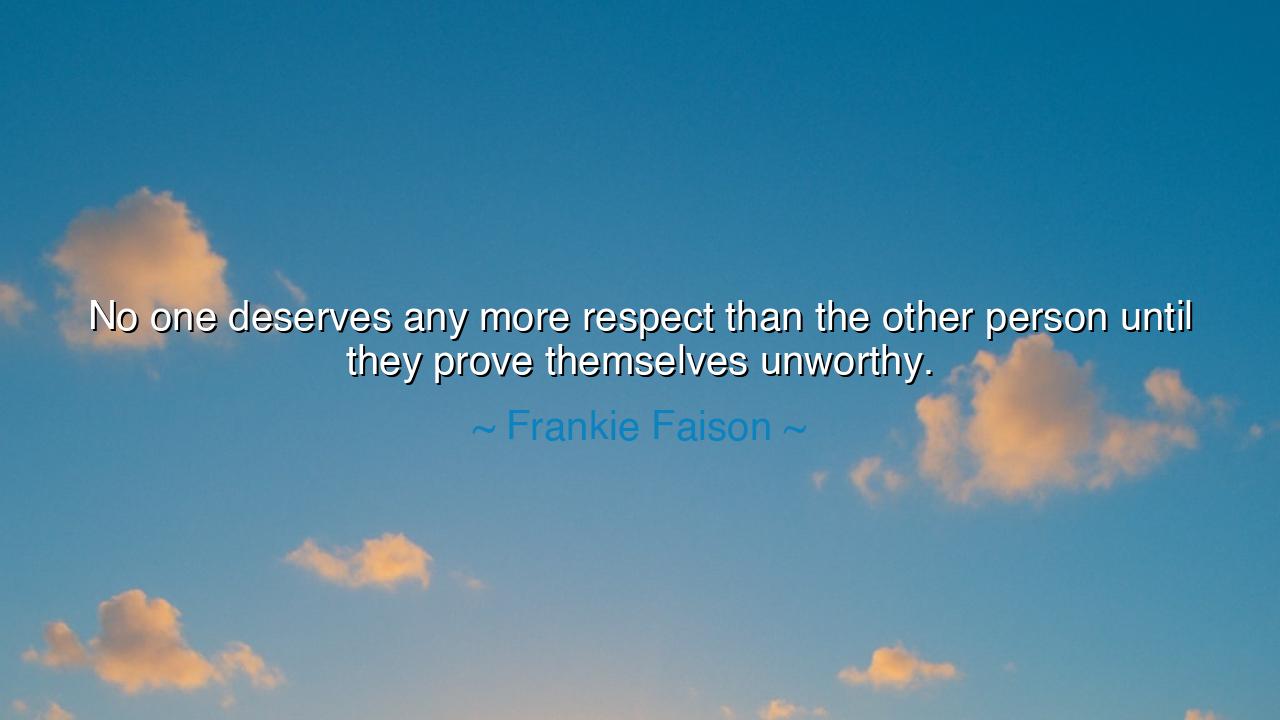
No one deserves any more respect than the other person until they
No one deserves any more respect than the other person until they prove themselves unworthy.






When Frankie Faison said, “No one deserves any more respect than the other person until they prove themselves unworthy,” he spoke not as an actor on a stage, but as a sage of life’s theater. In those few words lies a truth that pierces through centuries of pride, class, and hierarchy — the truth that respect is not the privilege of the powerful, but the birthright of every soul. His words call us to remember that all humans, whether clothed in rags or robes, stand equal before the judgment of decency. Until a person’s actions strip them of that dignity, we must meet all with reverence and fairness, for this is the essence of justice and the seed of peace.
To understand his meaning, one must first see respect not as flattery, but as recognition — the quiet acknowledgment that another being carries within them the same divine spark as oneself. The ancients called this the law of philia, the sacred kinship between all who live. Faison’s teaching reminds us that this respect should not be hoarded or withheld by station, color, or creed, but given freely at first meeting, as one offers a gift to a guest. For in doing so, we affirm the nobility of our own spirit. To respect another is not submission; it is the act of seeing rightly, of honoring the shared humanity that binds the earth together like the threads of a single cloth.
The origin of this truth lies not only in Faison’s personal wisdom, but in the timeless moral codes of civilizations long past. In the scrolls of Confucius, it is written: “The noble man esteems all men equally, and only their actions distinguish them.” In the parables of Jesus, the humble Samaritan was exalted above the proud priest, for worth is shown not in title but in deed. And in the words of Marcus Aurelius, emperor and philosopher, we find the same echo: “Treat men as you would the gods — until they prove unworthy.” Thus, Faison’s insight is not new, but eternal — a torch passed from the ancients to our age, burning still with the fire of equality and grace.
Consider the tale of Nelson Mandela, who, after twenty-seven years of imprisonment, emerged without hatred in his heart. When he became president of South Africa, he greeted even his former jailers with respect, not revenge. Many thought this impossible — yet Mandela understood that respect given freely has the power to heal more deeply than punishment ever could. He did not wait for others to earn it; he offered it first. And by doing so, he revealed the strength of his spirit, while others, through their cruelty, revealed their unworthiness. This is the paradox at the heart of Faison’s teaching: that those who offer respect lose nothing, but those who betray it lose everything.
In our own time, the world seems to tremble under the weight of division and contempt. We are quick to judge, slow to listen, and eager to withdraw respect at the slightest difference. Yet Faison’s words remind us that the foundation of harmony is not agreement, but mutual regard. To live by this creed is to choose generosity of spirit over suspicion, to extend grace before condemnation. It is to live as the ancients urged — with measured honor, granting to each person the dignity they deserve until their actions compel otherwise. For only when respect flows in both directions can trust take root and society endure.
But his words hold a second lesson as well — that respect once lost must be earned anew. For there are those who betray the sacred trust of decency, who exploit kindness and defile fairness. To such souls, Faison’s teaching grants no immunity. The respect given freely at first must be withdrawn when truth demands it, for compassion without discernment becomes weakness. Thus, the wise man honors all but worships none. He treats all with respect, but kneels only to integrity.
And so, my children of the present age, let this truth be engraved upon your hearts: Begin with respect, end with wisdom. Let no prejudice darken your first glance upon another soul. See in each face a reflection of your own, and greet it with dignity. But if deceit, cruelty, or arrogance reveal themselves, let your respect fall away as leaves in winter, and walk onward in strength. This balance — of grace and discernment — is the path of the noble spirit. For in the end, as Frankie Faison reminds us, true respect is not given to the few — it is the birthright of all, and the test of character for those who would keep it.






AAdministratorAdministrator
Welcome, honored guests. Please leave a comment, we will respond soon